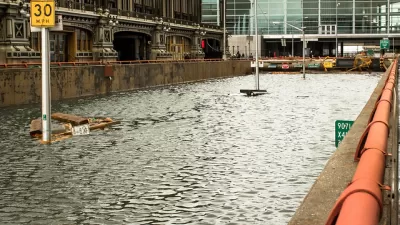Dysfunctional and wasteful practices have defined the army Corps of Engineers for years. Despite being caught in the act many times, the Corps continues to propose and push forward unnecessary projects, according to this article.
"In 2000, the Army Corps of Engineers was caught red-handed concocting its justification before launching a $1 billion project on the upper Mississippi River system. After the scandal died down, the corps admitted there wasn't really enough barge traffic to justify construction -- but proposed a $4 billion project, because there was a remote possibility things might change someday. And yes, the project recently sailed through a united Congress, where water projects are a time-honored form of political currency that steer jobs and money to the constituents and contributors of powerful members."
"By corps standards, pouring thousands of tons of concrete into the Mississippi and Illinois Rivers to relieve nonexistent barge congestion with seven new locks is no environmental disaster; those rivers are already highly engineered and degraded. But it is a stark example of the dysfunction of the corps -- its dishonest analyses, anachronistic priorities, predilection for makework, and desperation to please its congressional patrons and special-interest clients. And that dysfunction is itself an environmental disaster -- not only because some of the porky boondoggles it produces destroy pristine rivers and enormous swaths of wetlands, but because an honest corps with better priorities could help revive America's ravaged ecosystems."
"Since 2000, corps leaders have repeatedly promised more environmental sensitivity and better economic analyses. But they keep rubber-stamping the same wasteful and destructive pork that soured their reputations in the first place. As I have written in Grist, the dysfunction of the corps and America's water resources system drowned the city of New Orleans and killed more than 1,000 people in 2005. And not even that catastrophe has prompted change. So I was pretty naïve to expect the debacle on the upper Mississippi to lead to reform."
FULL STORY: Cry Me a River

Planetizen Federal Action Tracker
A weekly monitor of how Trump’s orders and actions are impacting planners and planning in America.

Map: Where Senate Republicans Want to Sell Your Public Lands
For public land advocates, the Senate Republicans’ proposal to sell millions of acres of public land in the West is “the biggest fight of their careers.”

Restaurant Patios Were a Pandemic Win — Why Were They so Hard to Keep?
Social distancing requirements and changes in travel patterns prompted cities to pilot new uses for street and sidewalk space. Then it got complicated.

Platform Pilsner: Vancouver Transit Agency Releases... a Beer?
TransLink will receive a portion of every sale of the four-pack.

Toronto Weighs Cheaper Transit, Parking Hikes for Major Events
Special event rates would take effect during large festivals, sports games and concerts to ‘discourage driving, manage congestion and free up space for transit.”

Berlin to Consider Car-Free Zone Larger Than Manhattan
The area bound by the 22-mile Ringbahn would still allow 12 uses of a private automobile per year per person, and several other exemptions.
Urban Design for Planners 1: Software Tools
This six-course series explores essential urban design concepts using open source software and equips planners with the tools they need to participate fully in the urban design process.
Planning for Universal Design
Learn the tools for implementing Universal Design in planning regulations.
Heyer Gruel & Associates PA
JM Goldson LLC
Custer County Colorado
City of Camden Redevelopment Agency
City of Astoria
Transportation Research & Education Center (TREC) at Portland State University
Camden Redevelopment Agency
City of Claremont
Municipality of Princeton (NJ)





























